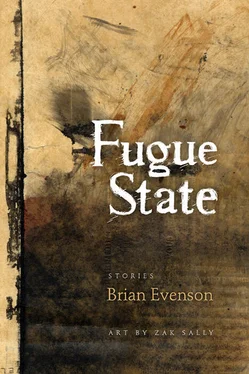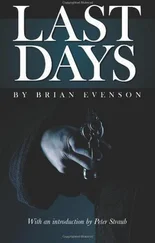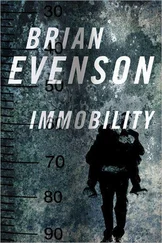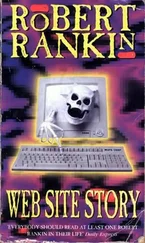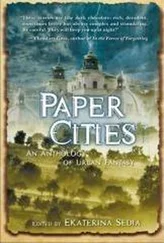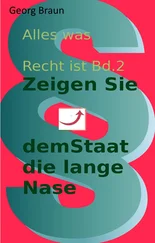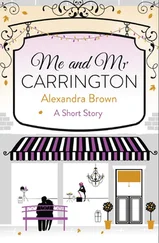He shook his head to clear it. It did not clear. He managed, after some effort, to raise the lid of the answering machine and pop the cassette out and get his own cassette in. He pressed the play button and then stumbled away toward where he hoped a chair would find him.
There was a crackle and a beep and the voice began to speak.
Hello, it said. Mr. Hapner? Is that in fact the correct name? My name is Arnaud…
Did it all come flooding back to him? Not exactly, no. It went on from there but he was no longer listening. Hapner, his mind was saying, Arnaud. He tried to sit down, crashed to the floor. He lay there, staring at the ceiling, trying to hold on to the two names, to keep them at least. But they were already slipping away.
VI.
He awoke to find himself lying on a couch, prone. Across from him, collapsed on the floor, was an abnormally large man with his shirt and hands smeared with blood, blood crusted around his eyes as well. The man’s arm was clearly broken, turned out from the body at a senseless angle, a pinkish lump of bone protruding just above the wrist.
He sat up, feeling weak. His mouth was dry. When he tried to stand, he grew weak and quickly sat down again. He sat there on the couch, gathering his breath, waiting, staring at the man on the floor.
Did he know him? Surely he must know him or why else would they both be there?
“Hello?” he said to the man.
The man didn’t move, dead probably.
But where was here? he wondered. Was this his apartment? It didn’t look familiar exactly, but he couldn’t bring another apartment to mind either. But if this was his, why wouldn’t he know it?
He stood, and stumbled across the room and toward the kitchen, passing the man on the way. Up close he could see the man was clearly dead, his face the color of scraped bone, a smell coming off him.
In the kitchen he looked into the fridge, found it empty. The pantry was full of cans. He couldn’t read any of the labels. What’s wrong with me? he wondered. He opened a can and drank the contents cold — some kind of soup, glassy with oil on the top. After a while, he felt a little better.
When he went back into the living room, he saw the blinking light. It took him a moment to figure out what it meant, what it belonged to.
He had to stand on a foot ladder to reach it. The casing of the machine, he saw, was streaked with blood. He depressed the button.
Hello, a voice said. Mr. Hapner? Is that in fact the correct name?
Hapner, he thought, the name sizzling vaguely in his head and then beginning to fade. Unless it was not his house, unless the name belonged to the man dead on the floor. But no, it must be his name, it sounded right enough, and the foot ladder, the dead man wouldn’t have needed a foot ladder to step on. Ergo, his house. Ergo, Hapner. If that is in fact the correct name?
There had been, the voice told him, Mr. Arnaud told him, a misunderstanding. Everyone’s heart was in the right place. But he, Hapner, was being asked to contact Arnaud’s wife, to pass on information, to find out what had become of him.
I must be a private detective, thought the small man, thought Hapner.
He went into the bathroom and looked at his face. He too, like the dead man, was wearing a mask of blood, the blood thickest around his eyes. They shared that at least. The face — small, pudgy — was unfamiliar. But it must be my own face, he thought. Nevertheless he couldn’t help but reach out and touch the mirror, assure himself that it was solid, flat glass.
In the bedroom, he changed his clothes. The new clothes fit. Thus, this was his house. Ergo. Thus, he was Bentham. Or not Bentham exactly, Bentham was whom he was looking for. What had the name been exactly? It started with an h, he thought, or some similar letter. Similar in what way? He went back into the living room, skirting a dead body — had he seen it before? yes, he had, but who was it? — and depressed the answering-machine button again. Ah, yes. Hapner. That was him. And it was Arnaud he was looking for, not Bentham.
He got out a pen and a piece of paper and wrote it down, but found he could make no sense of the marks on the paper. What’s wrong? he wondered, what’s wrong? He would, he supposed, somehow just have to remember.
He started out the door— Arnaud, he was saying in his head, Hapner, I’m Hapner, I’m looking for Arnaud —and stopped dead. The other doors around his own had been barricaded over with sheets of plywood. But why? he wondered, and then wondered, Why not my door?
He went down the stairs and then down a hall whose walls were smeared with blood, then down another set of stairs that opened onto a lobby, two shattered glass doors leading out into the street. He pushed one open, felt a pricking on his hands and looked to see them glittery with powdered glass, minute cuts all over them. He used his shoe to open the door the rest of the way, stepped out into the street.
The street was deserted, a car overturned and burnt to a husk a dozen feet from where he stood, another car in the middle of the street, both doors open, clumps of paper eddying about it, garbage, a fine rain of ash. The building across the street from him, a large complex of some sort, was surrounded by a chain-link fence topped with barbed wire, another similar fence a half-dozen feet inside it and parallel to it, the gates of both fences twisted off their hinges. The building was set off from the road, and between him and it were scores of abnormally large men in white protective suits, sprawled about, no marks on them, suits intact, all probably dead. Good Christ, he thought. For just an instant, the scene wavered, flattening out in front of him, everything fading away or coming all too close. But then he blinked, and blinked again, and it all seemed all right again, though somehow the sun had moved and the sky had gone darker.
He crossed the street and passed through the gate and approached one of the prone men. The glass shield over the man’s face was obscured by blood. He looked at another. It was the same. He stopped looking.
What am I doing? he wondered. What am I looking for?
He couldn’t remember exactly. He was looking for something or someone, it started with, he could almost remember, it was a letter that he … perhaps r? But what did that tell him? It didn’t tell him anything at all.
He turned around and looked over his shoulder at the building across the street. It was an apartment complex, ten or twelve stories tall, its door shattered.
He stood staring at it for a long time. Something about it struck him as significant. Familiar? What, he wondered again, was he looking for, and who was he exactly, again? What was the name?
He kept staring, feeling a slow panic welling through him.
He took a step forward without looking, almost fell over one of the bodies. He kicked it softly, then stepped around it.
I am looking for something, he tried to tell himself, or someone. Probably, he tried to tell himself, I’ll know it when I find it.
He looked back again at the building across the street, then turned toward it.
Probably as good a place to start as any, he thought. He crossed the street, opened the door to the building. Who knows what I will find? he thought.
Another instant and he was gone.
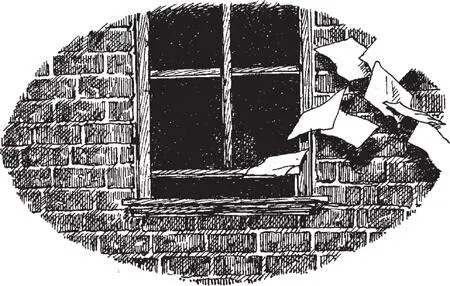
I.
Toward evening, well before Traub expected it, came a notable transformation in the face. The nose became more and more accentuated, like a blade, the cheeks grew hollow, the skin began to tighten. Traub continued trying to draw the profile, but the face was changing with such rapidity that he could capture it, when he captured it at all, only at several removes. He had the distinct impression that he was observing not one but several faces, coming one after another, quicker and quicker until finally, moments before death, the rush of faces was so rapid that it made Traub feel dizzy, and he forgot the paper, the pencil, and just watched, and in the vast shuffle of humanity nearly caught sight of himself.
Читать дальше
